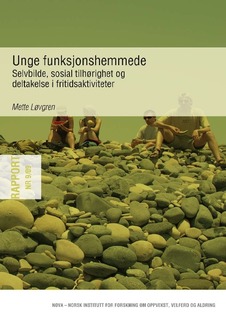| dc.contributor.author | Løvgren, Mette | |
| dc.date.accessioned | 2020-06-07T21:05:31Z | |
| dc.date.accessioned | 2021-04-29T13:49:16Z | |
| dc.date.available | 2020-06-07T21:05:31Z | |
| dc.date.available | 2021-04-29T13:49:16Z | |
| dc.date.issued | 2009 | |
| dc.identifier.isbn | 978-82-7894-305-2 | |
| dc.identifier.issn | 0808-5013 | |
| dc.identifier.uri | https://hdl.handle.net/20.500.12199/3294 | |
| dc.description.abstract | Which factors promote and which factors inhibit young disabled people’s participation in organized leisure activities? Does participation in organized leisure activities facilitate social belonging? How does participation in organized leisure activities contribute to the self-esteem and forming of identity of young disabled people? These are the questions that will be addressed in this report. The structure of the rapport reflects the above mentioned research questions. Achieving one’s goals for participation and feelings of inclusion and recognition are important factors for the continuation of disabled youth’s participation in organized leisure activities. Participation in organized leisure activities may contribute to social inclusion and increase the youth’s sense of belonging, but the context of organized leisure activities may also reproduce the social stigma and exclusion that disabled youth experience at other social arenas. Physical and social barriers are factors that inhibit young disabled people’s participation in organized leisure activities, and reduce their sense of self-worth. Social barriers are often perceived as natural and unchangeable, and viewed as individual traits rather than context specific conditions for participation. The “undetectable” nature of social barriers underlines the importance of objective criteria regarding successful participation. Both social belonging and participation in the main activity should be held as desirable and attainable goals. One of the main findings in this report is that a majority of the informants perceive questions regarding participation in organized leisure activities as peripheral in their everyday lives. This is a consequence of previous negative experiences from participation in such activities. The informants often experience negative stereotypes and prejudice. Their descriptions of self image and identity are closely entwined with how they believe others see them. | en |
| dc.description.abstract | Denne rapporten belyser enkelte aspekter ved unge funksjonshemmedes deltakelse i organiserte fritidsaktiviteter. Hva hemmer og hva fremmer deltakelse i organiserte fritidsaktiviteter? Innebærer deltakelse i fritidsaktiviteter økt sosial tilhørighet? Hvilken rolle spiller deltakelse i organiserte fritidsaktiviteter når det gjelder selvbilde og identitet for funksjonshemmede ungdom og unge voksne? Rapporten baserer seg på kvalitative intervjuer med 29 unge og unge voksne. Informantene forteller om til dels lav grad av sosial tilhørighet. Organiserte fritidsaktiviteter kan representere en ny arena med nye muligheter for sosiale relasjoner. Men slike aktiviteter oppleves oftere som en konservativ arena, hvor sosiale mønstre fra blant annet skolen reproduseres. Selvbilde konstrueres i dialog med omgivelsene. For mange av informantene involverer en slik dialog spørsmål vedrørende anerkjennelse, det å bli sett og selvstendighet. | no_NB |
| dc.publisher | Oslo Metropolitan University - OsloMet: NOVA | |
| dc.relation.ispartofseries | NOVA Rapport 9/09 | |
| dc.subject | NOVA | |
| dc.title | Unge funksjonshemmede | no_NB |
| dc.type | Report | |
| fagarkivet.author.link | https://www.oslomet.no/om/ansatt/mettelo | |
| fagarkivet.source.pagenumber | 66 | |
